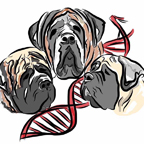
The MCOA Health Committee is partnering with UC Davis to offer discounted DNA testing for ATP7A and ATP7B gene mutations.
What is it?
The ATP7A and ATP7B genes are involved with the transport and regulation of copper within a dog's body. Mutations of the ATP7B gene can cause copper overload within the liver and the brain.1 So far, most studies in dogs have focused on the ATP7B mutation. It has been found to affect the following breeds: Labrador Retrievers, Bedlington Terriers, Doberman Pinschers, and Black Russian Terriers.1
The ATP7A gene mutation in dogs has not been widely researched yet. Hypothetically, ATP7A gene mutations could lead to copper deficiency throughout the body, which in turn could have a wide range of detrimental health effects. In humans, ATP7A gene mutations are rare, but have been studied more extensively than in dogs. ATP7A disorders in humans can range from Occipital Horn Syndrome to Menke's Disease, which is the most severe form.
So far, the ATP7A mutation has only been found in the Labrador Retriever breed, where it helps to reduce the elevated copper levels of dogs with ATP7B gene mutations.1 In Labrador Retrievers, the ATP7A mutation is considered to be beneficial for dogs who also have the ATP7B gene mutation.1
How are the genes inherited?
The ATP7A gene is located on the X-chromosome, which means that males only carry one copy of the gene and females carry two copies. The ATP7B gene is located on another chromosome, so both males and females have two copies.
Why are we testing Mastiffs?
The ATP7A and ATP7B gene mutations have been found within our breed. We don’t know if there is any clinical significance for Mastiffs who carry one or more copies of either gene mutation. At this point, we do not know if these gene mutations have an effect on Mastiff health.
Should breeding decisions be based on the results of these tests?
There is currently no evidence to make breeding recommendations based on these types of gene mutations within the Mastiff breed.
What is the MCOA Health Committee doing?
We will be launching a study to help determine the prevalence of the gene mutations within our breed, and to determine if there are any potential effects on the health of the dogs. Participation in the study would require completion of an ATP7A/ATP7A DNA test, an initial health survey, and subsequent annual follow-up surveys for the life of the dog. Participation in the study is completely voluntary, and individual results and dog information will be kept confidential.
What is the long-term goal of the study?
If it is discovered that the ATP7A and/or ATP7B gene mutations are linked with copper-related health issues, then we will further explore methods to help reduce symptoms in dogs with copper deficiency (or overload).
Where can I get my Mastiff tested?
The MCOA Health Committee will be assisting with DNA submission at the National Specialty this year in Kingsport, TN. The cost for the UC Davis test will normally be $40. For MCOA members, the health committee will be paying $15 of the fee, bringing the total cost to $25. Sample submission will be available online, after the National. If you have already tested your dog with one of the genetic panels, we will have a submission portal for that data, as well.
How do I participate in the study?
Sign-up forms will be available at the National Specialty, and you will be emailed a link to the survey at a later date.
Do I have to participate in the study in order to get the discounted price for the DNA test?
No, participation is completely voluntary. But please consider that the strength of the study depends on numbers. The more dogs who take part in the study, the more likely we are to find answers.
References
1. Fieten, H. et al. The Menkes and Wilson disease genes counteract in cooper toxicosis in Labrador retrievers: a new canine model for copper-metabolism disorders. Dis Model Mech. 2016 Jan 1;9(1):25-38. Doi:10.1242/dmm.020263↩
2. Copper Toxicosis (Menkes and Wilson disease). UC Davis Veterinary Medicine, Veterinary Genetics Laboratory website. [https://vgl.ucdavis.edu/test/copper-toxicosis]. Accessed April 2025 ↩
Updated: 1/3/2026